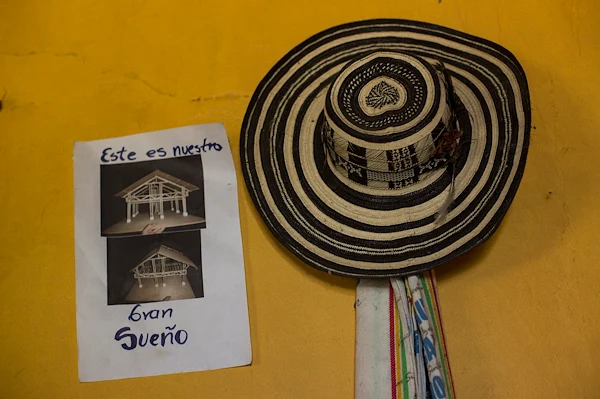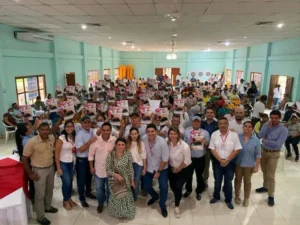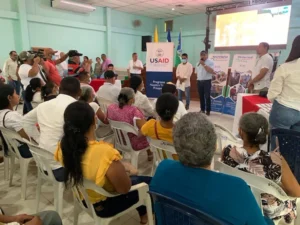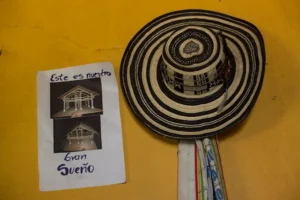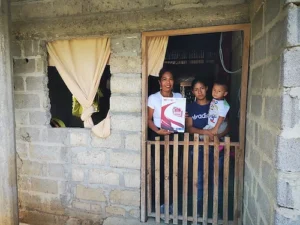Three USAID programs in Colombia are working together to build the capacity local government to leverage USAID investments, mobilize resources, and improve basic services for rural populations
When people talk about Colombia’s Bajo Cauca region, located north of Medellin, many conjure chapters of the most dramatic violence in the history of the nation’s war. But that perception is changing in Valencia, a small municipality of 42,000 people in Bajo Cauca. In the wake of the 2016 Peace Accords, Valencia has benefited from development programs and become an example of how coordinated efforts made through USAID investments can transform Colombia’s rural territory.
In August, farmers living in the village of Santo Domingo saw how Valencia’s Municipal Land Office delivered land titles to 43 families who had been living on unformalized land for decades. They also witnessed how the local land office titled their health clinic, officially making it a municipal property. The property title is one of the first steps to investing in public goods, since public funds can be spent on health clinics that sit on legalized property. The USAID-funded Land for Prosperity (LFP) is supporting municipalities like Valencia with financial and technical assistance to run local land offices and improve land governance.
USAID Partnerships
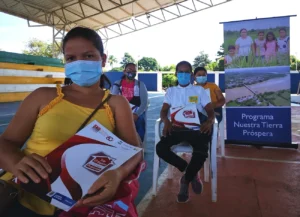 “By supporting the Municipal Land Office and land formalization, USAID is also supporting rural development, a in this particular case, improving the local health clinic,” said Héctor Sepúlveda, LFP’s Regional Coordinator of Bajo Cauca Antioqueño, where Valencia is located.
“By supporting the Municipal Land Office and land formalization, USAID is also supporting rural development, a in this particular case, improving the local health clinic,” said Héctor Sepúlveda, LFP’s Regional Coordinator of Bajo Cauca Antioqueño, where Valencia is located.
Land for Prosperity is USAID’s largest investment in land tenure programming in the world, aimed at strengthening Colombia’s land administration systems and improving rural development and the conditions of rural households.
“USAID is our strategic partner, both in terms of human resources and the Municipal Land Office,” explains Eliécer Martínez, Valencia’s Secretary of Planning. “USAID provided us with the most modern land survey equipment that is used nationally and internationally.”
Since 2016, USAID has increased its focus on Colombia’s Bajo Cauca region, ensuring that its programs avoid repetition and build on each other’s work. In the case of a health clinic titled by the Municipal Land Office, USAID Responsive Governance Program then structures a project to manage funds for the clinic’s improvements in infrastructure and equipment. Then the USAID Partners for Transparency Program creates a civil society group to oversee the funds invested in adapting the health post.
Under this integrated strategy, USAID programs in Colombia can reach those underfunded municipalities historically affected by the armed conflict with complementary services. While Land for Prosperity increases the government’s capacity for land governance and promotes a culture of formal land ownership, the Responsive Governance program improves the management of public finances while the Partners for Transparency program leverages local capacity and commitment to promote a culture of transparency and accountability.
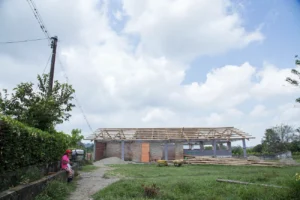
“We can’t lay a single brick if the property is not titled. Land formalization is the first step. Now that the municipality has the registered land title, we can start building and improving the health clinic.”
– Orlando Benítez, Santo Domingo’s health director
Filling Gaps
Land for Prosperity has facilitated the titling of 10 municipal properties in Valencia, including the Santo Domingo health clinic. In addition, the Municipal Land Office has titled 91 private urban parcels, giving poorer residents land titles for land they have owned for decades.
“In Santo Domingo, we are relieved to be getting a health clinic. We have a school but have been missing a health clinic for a long time,” Benítez says. “It is essential for the community, and thanks to USAID programs for moving this project forward.”
Once built, the health post will benefit more than 2,500 people from Santo Domingo and neighboring villages Cocuelo and Cocuelo Medio. It will have outpatient services, dentistry, and medical check-ups. To see a doctor, the inhabitants of Santo Domingo and neighboring villages must pay 50,000 pesos (USD $12) in travel costs to reach Valencia, which is a lot for a farmer whose income, in the best of cases, reaches USD $500 a month.
“In Valencia, USAID saw the opportunity to work on an identifiable need, which is the health center, then we managed to formalize the property,” says Andrea Olaya, Regional Manager of Land For Prosperity. “Partners for Transparency and its overseers are going to be very attentive to the entry of resources.
Concerted Efforts
USAID has prioritized ten regional integration initiatives including Nariño’s Pacific coast (Tumaco), Bajo Cauca, and Catatumbo (Norte de Santander). USAID is investing in property formalization, strengthening local government capacity, and agriculture, all with a differentiated gender approach that places an emphasis on the needs of rural women.
“USAID’s Regional Integration Initiative is crucial because it seeks the synergy among all the initiatives being implemented to produce a greater impact for the populations,” says Andrea Olaya, Regional Manager of Land for Prosperity.
USAID is supporting 11 municipal-wide land titling campaigns across Colombia. Each campaign depends on a variety of factors and is expected to require an average of two years to complete implementation. By 2025, the government will have updated more than 115,000 parcels in the national cadaster with the possibility of delivering up to 40,000 land titles.
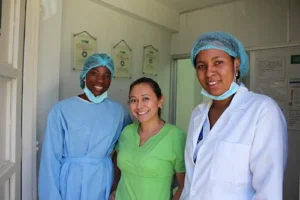
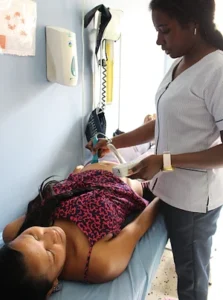
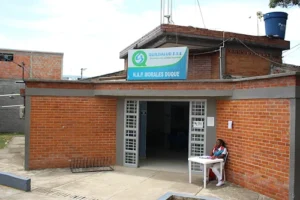
A Health Clinic in Santander de Quilichao, Cauca, titled with support from USAID
In Bajo Cauca, LFP is supporting the municipal wide parcel sweep in Caceres, and Colombia’s National Land Agencies are supporting the parcel sweep in Valencia.
Under the Programs with a Territorial Approach strategy created by the government following the 2016 Peace Accords, places like Valencia have been favored with initiatives managed by the Territorial Renewal Agency (ART) and the municipality.
“In addition to the Land Office, we are highly grateful to USAID programs such as the one that provided us with the road inventory, making us the first and only municipality in Cordoba to have it,” said Valencia’s Secretary of Planning, Eliecer Martinez. “These projects are not physically seen but greatly benefit the people.
Cross posted from Land for Prosperity Exposure site


